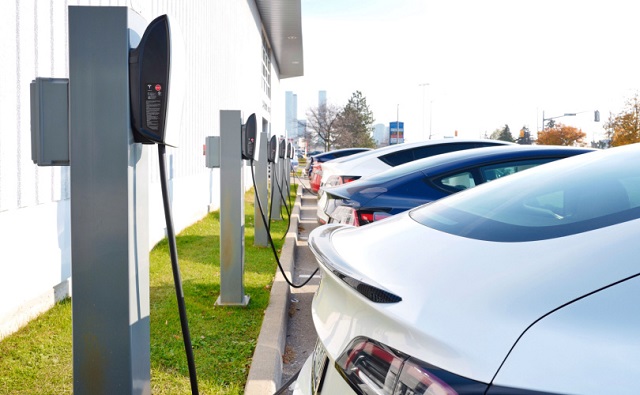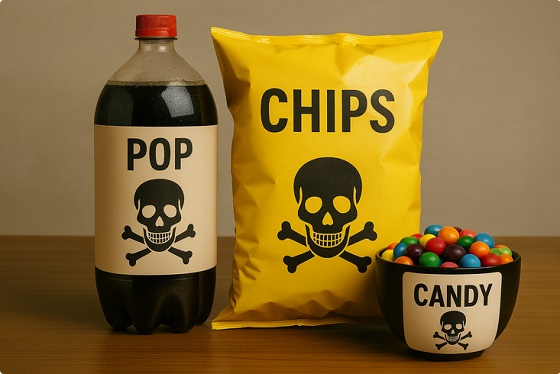Alberta
Danielle Smith vows to fight Trudeau’s ‘unconstitutional’ plan to ban gas-powered cars

From LifeSiteNews
Alberta’s premier called a federal government directive that all new vehicles are electric by 2035 ‘a disaster.’
Alberta Premier Danielle Smith made it crystal clear that she intends to fight with “everything” at her disposal what she called an “unconstitutional” new federal government mandate that all new cars and trucks by 2035 be electric, which would in effect ban the sale of new gasoline- or diesel- only powered vehicles after that year.
“The Government of Alberta will do everything within its legal jurisdiction to thwart implementation of these unconstitutional regulations in our province,” Smith said in a statement yesterday on the EV mandate that was posted to X (formerly Twitter).
“The sheer hypocrisy of this announcement is astounding. To date, the federal government’s EV approach has been a disaster.”
On Tuesday, Canadian Environment Minister Steven Guilbeault announced the “Electric Vehicle Availability Standard.” This is a plan that will try and mandate more EV or so-called “zero-emission vehicles” (ZEV) sales via increasing targets per year.
Starting in 2026, the federal government will mandate that 20% of all new cars or trucks are ZEV. That number will move to 60% by 2030 and to 100% by 2035. So-called cars that qualify under the new rules are battery electric, plug-in hybrid, or hydrogen fuel cars.
This is not the first time Smith has called out federal EV mandates. Early this year, she blasted what was then a Trudeau government proposal to ban new sales of gas-powered cars after 2035. She called it an attack on her province’s oil and gas industry.
Trudeau’s war on the internal combustion engine comes despite the fact Canada has the third largest oil reserves in the world, which is produced ethically, unlike in other nations.
Electric cars cost thousands more to make and buy, are not suited to Canada’s cold climate, offer poor range and long charging times (especially in cold weather), and have batteries that take tremendous resources to make and are hard to recycle.
A recent report from the Western Standard documents how one Alberta couple found out the hard way that going EV does save not time or money.
Trudeau’s EV mandates have also been called out by the automotive industry in Canada. The Canadian Vehicle Manufacturers’ Association said in response to the new EV mandate that forcing people to buy EVs will “disproportionately impact households living in rural and northern communities that may have lower access to public charging infrastructure.”
“In addition, northern communities are expected to face more difficulties with the transition to EVs due to prolonged periods of cold temperatures that may affect the range of battery-powered electric vehicles.”
Conservative Party of Canada leader Pierre Poilievre said he would overturn Trudeau’s “Draconian” EV mandate should he win the next election and his party form government.
Smith warns power grids won’t be able to handle extra pressure of EVs
Smith noted that when it comes to Trudeau’s EV mandate, “Ottawa is trying to force increased demands on the electricity grid while simultaneously weakening Alberta’s and other provinces’ grids through their federal electricity regulations.”
“Our electric grids are not equipped to handle the massive demand surge that a forced full-scale transition to EVs would need to accommodate the delusional timelines in Ottawa’s regulations, and the federal government has not provided remotely enough financial assistance to assist provincial grids to meet this mandated electricity demand,” she noted.
Smith was clear that while the Alberta government “supports reducing emissions from the transportation sector,” it also supports choice when it comes to what kind of car or truck a person wants to buy.
She said any new rules should be led by “consumers and businesses” and not by government decree.
“The federal government has no legal or moral authority to tell Albertans what vehicles they can and cannot buy,” she said.
“The federal government should rein back its failed command economy tactics and work with us on a consumer-based market approach that is achievable and doesn’t hurt people.”
Smith then took a shot at the Trudeau Liberals and its lack of a plan when it comes to supporting the power grid.
“Not only are there not enough electric vehicle chargers, Ottawa doesn’t even know where EV chargers are needed. The federal government will fail to hit its target even where it has complete discretion, and yet it plans to mandate similar targets on consumers throughout all of Canada,” she said.
“Although it seems rather obvious to say, emissions targets and regulations must be realistic, achievable, and cannot result in multiple severe harms to millions of Canadians. A federal government that can’t transition its own fleet to EVs should not be telling Albertans and Canadians to do what even it is unable to do.”
Since taking office in 2015, Trudeau has continued to push a radical environmental agenda similar to the agendas being pushed the World Economic Forum’s “Great Reset” and the United Nations “Sustainable Development Goals.”
The reduction and eventual elimination of the use of so-called “fossil fuels” and a transition to unreliable “green” energy has also been pushed by the World Economic Forum (WEF) – the globalist group behind the socialist “Great Reset” agenda – an organization in which Trudeau and some of his cabinet are involved.
A June 2017 peer-reviewed study by two scientists and a veteran statistician confirmed that most of the recent global warming data have been “fabricated by climate scientists to make it look more frightening.”
There have been two recent court rulings that have dealt a blow to Trudeau’s environmental laws.
The most recent was the Federal Court of Canada on November 16 overturned the Trudeau government’s ban on single-use plastic, calling it “unreasonable and unconstitutional.”
The second ruling comes after Canada’s Supreme Court recently sided in favor of provincial autonomy when it comes to natural resources. The Supreme Court recently ruled that Trudeau’s law, C-69, dubbed the “no-more pipelines” bill, is “mostly unconstitutional.” This was a huge win for Alberta and Saskatchewan, which challenged the law in court. The decision returned authority over the pipelines to provincial governments, meaning oil and gas projects headed up by the provinces should be allowed to proceed without federal intrusion.
The Trudeau government, however, seems insistent on defying the recent rulings by pushing forward with its various regulations.
Alberta
Emissions Reduction Alberta offering financial boost for the next transformative drilling idea

From the Canadian Energy Centre
$35-million Alberta challenge targets next-gen drilling opportunities
‘All transformative ideas are really eligible’
Forget the old image of a straight vertical oil and gas well.
In Western Canada, engineers now steer wells for kilometres underground with remarkable precision, tapping vast energy resources from a single spot on the surface.
The sector is continually evolving as operators pursue next-generation drilling technologies that lower costs while opening new opportunities and reducing environmental impacts.
But many promising innovations never reach the market because of high development costs and limited opportunities for real-world testing, according to Emissions Reduction Alberta (ERA).
That’s why ERA is launching the Drilling Technology Challenge, which will invest up to $35 million to advance new drilling and subsurface technologies.
“The focus isn’t just on drilling, it’s about building our future economy, helping reduce emissions, creating new industries and making sure we remain a responsible leader in energy development for decades to come,” said ERA CEO Justin Riemer.
And it’s not just about oil and gas. ERA says emerging technologies can unlock new resource opportunities such as geothermal energy, deep geological CO₂ storage and critical minerals extraction.
“Alberta’s wealth comes from our natural resources, most of which are extracted through drilling and other subsurface technologies,” said Gurpreet Lail, CEO of Enserva, which represents energy service companies.
ERA funding for the challenge will range from $250,000 to $8 million per project.
Eligible technologies include advanced drilling systems, downhole tools and sensors; AI-enabled automation and optimization; low-impact rigs and fluids; geothermal and critical mineral drilling applications; and supporting infrastructure like mobile labs and simulation platforms.
“All transformative ideas are really eligible for this call,” Riemer said, noting that AI-based technologies are likely to play a growing role.
“I think what we’re seeing is that the wells of the future are going to be guided by smart sensors and real-time data. You’re going to have a lot of AI-driven controls that help operators make instant decisions and avoid problems.”
Applications for the Drilling Technology Challenge close January 29, 2026.
Alberta
New era of police accountability

The Police Review Commission (PRC) is now fully operational, giving Albertans a single, independent process to file policing complaints and ensure accountability.
Alberta’s government is putting the province at the forefront of police oversight in Canada with the creation of the PRC. This new commission replaces the current patchwork of police investigating police with one independent body responsible for receiving complaints, conducting investigations and overseeing disciplinary hearings. By centralizing these functions within a single, independent agency, Alberta is ensuring complaints are handled fairly and consistently.
“The Police Review Commission represents a new era in how Alberta addresses policing complaints. These changes are part of a broader paradigm shift where police are no longer seen as an arm of the state, but rather an extension and a reflection of the community they serve. As an independent agency, it is committed to fairness, accountability and public trust, ensuring every complaint is investigated impartially and resolved openly.”
The Police Amendment Act, 2022 laid the groundwork for this new model, establishing a modern approach to oversight built on accountability, consistency and public confidence. The PRC will manage the full complaints process from receiving and assessing, to investigating and resolving complaints related to police conduct, including serious incidents and statutory offences.
“The Alberta Association of Chiefs of Police welcomes the launch of the Police Review Commission as a meaningful step toward enhanced oversight and greater transparency in policing. By ensuring complaints are reviewed fairly and impartially, the Commission will help strengthen accountability and reinforce public trust in Alberta’s police agencies. Police leaders across the province are committed to working with the Commission and our communities to ensure every Albertan has confidence in the integrity of our police services.”
A timely and transparent complaint resolution process is essential for both the public and police. That is why the PRC must complete investigations within 180 days, and if more time is needed, the chief executive officer must publicly report on delays and provide justification. This ensures clarity, predictability and accountability throughout the process. The commission will be arm’s length from government and police services, meaning people can have greater confidence that their complaints will be investigated and resolved impartially.
“Our goal is to build trust in policing by delivering timely resolutions and fair, consistent outcomes that put people first. Every complaint will be reviewed thoroughly and handled with the transparency and respect Albertans expect and deserve.”
The PRC can also initiate systemic reviews related to police conduct or emerging trends without the need for a public complaint, and these reviews must be made public. Together, these measures create a clear, accountable process that strengthens transparency, supports continuous improvement and enhances trust in how police oversight is carried out across Alberta.
“Public safety and the confidence the public has in our police services and service members are incumbent for effective and responsible service delivery. The PRC has been developed so that Albertans may have a responsible and impartial mechanism to voice concerns regarding delivery of policing services in Alberta. I am confident that the PRC will be an inclusive and diverse representation of the communities, so we may better understand the most appropriate and effective way to respond to concerns regarding police services. I look forward to the positive outcomes for the community.”
The commission’s design was informed by engagement with Indigenous communities, law enforcement partners, municipal officials and community organizations, ensuring its structure and training reflect Alberta’s diversity and values.
Quick facts
- The PRC will handle complaints in three categories:
- Level 1: Death, serious injury and serious or sensitive allegations involving all police services in Alberta, as well as peace officer agencies.
- Level 2: Allegations of criminal and other statutory offences involving all police services in Alberta.
- Level 3: Complaints about non-criminal misconduct involving officers employed by municipal and First Nations police services.
- Complaints that fall outside the three categories will be referred to the appropriate bodies or agencies for review.
- The Alberta Serious Incident Response Team (ASIRT) will now operate under the PRC.
-

 Energy1 day ago
Energy1 day agoCanadians will soon be versed in massive West Coast LPG mega-project
-

 Alberta1 day ago
Alberta1 day agoKeynote address of Premier Danielle Smith at 2025 UCP AGM
-

 Alberta2 days ago
Alberta2 days agoNet Zero goal is a fundamental flaw in the Ottawa-Alberta MOU
-

 Food2 days ago
Food2 days agoCanada Still Serves Up Food Dyes The FDA Has Banned
-

 Addictions2 days ago
Addictions2 days agoManitoba Is Doubling Down On A Failed Drug Policy
-

 COVID-192 days ago
COVID-192 days agoFDA says COVID shots ‘killed’ at least 10 children, promises new vaccine safeguards
-

 Daily Caller1 day ago
Daily Caller1 day agoTom Homan Predicts Deportation Of Most Third World Migrants Over Risks From Screening Docs
-

 National16 hours ago
National16 hours agoMedia bound to pay the price for selling their freedom to (selectively) offend




